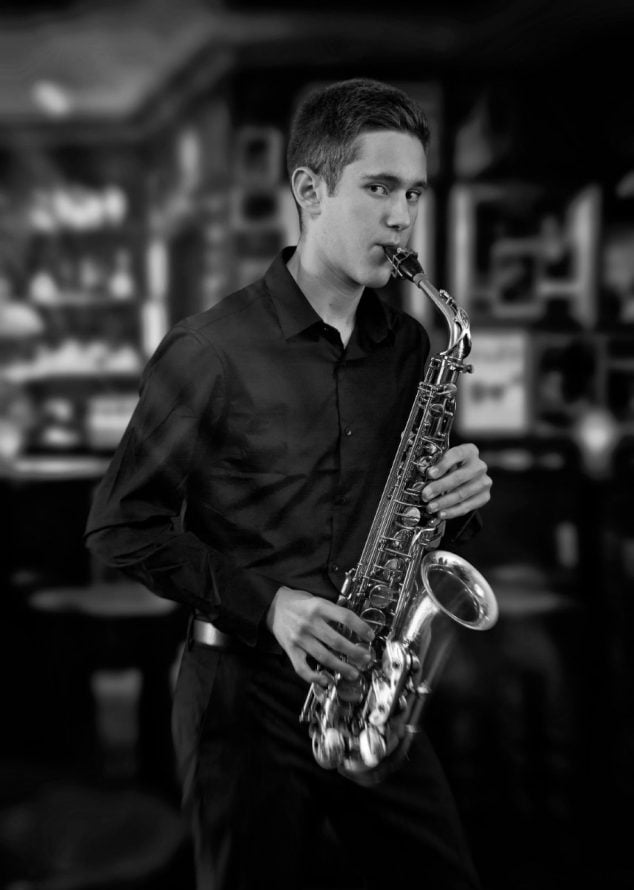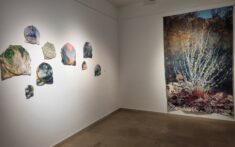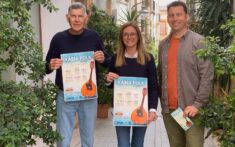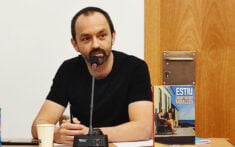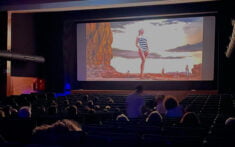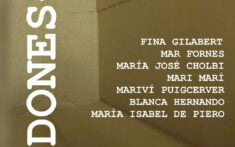The saxophonist of the Professional Conservatory of Xàbia and winner of the Intercentros 2019 Contest, Adam Martí García, will offer a concert at the Teulada-Moraira Auditorium this Sunday, February 23 at 12 noon. Martí will do it as a soloist at the Orchestral Encounter.
This performance, which has been held for six years, brings together the students of the different conservatories to jointly offer a concert under the direction, for the second consecutive year, of Miguel Romea, head conductor of the Verum Symphony Orchestra of Castilla La Mancha.
This meeting not only aims to promote orchestral music among the youth of the Navy but also drives the soloists who win the Intercentros Contest as is the case this year of the saxophonist and student of the Professional Conservatory of Jávea.
Adam Martí studies with Professor Carmelo Fresneda, head of the saxophone specialty at the Professional Conservatory of the city of Marina Alta. He also combines his musical studies with a second year of scientific baccalaureate at the IES Pedreguer.
Martí started when he was five years old, he traveled through the world of music and with the saxophone when he was very young too. Now he has been studying at the Conservatory of Jávea for nine years and next Sunday he will show his full potential.
Adam Martí, who acknowledges that the fact of starting to play the saxophone was a circumstantial fact, considers that he has never cared to invest hours on his instrument, although this meant sleeping less hours later. Martí recognizes that "There are certain moments in which touching has been a vital necessity, and has never lived it as an imposition." As he says, "It is simply to be consistent with what you like and accept what it means to spend time on one thing and not another", perhaps it is the most important issue, and this despite being doing second year of high school.
"It is comforting to see that other people have appreciated the effort used"
We leave an interview with this young musician who has been done from the Conservatory in which he expresses his passion for music and his dedication.
-Adam, tell us about your origins, where you were born and where you started your career.
That's a good question. At first I would answer that I am from Beniarbeig, but when studies and music make you spend so much time in other things and at the same time spend so much time with the people of these places, it is difficult to respond. Yes, I'm based on birth, yes, I'm from Beniarbeig, but I'm studying in Pedreguer. Despite the musical studies, I take them in Jávea and I play the band in Benidoleig. But it is more: the days that I go to Jávea I do not do it from Beniarbeig, but from the Xara because it is my grandfather who makes the sacrifice to take me so that I can realize my musical studies and to whom I am very grateful.
-It is a pride for the Conservatory of Jávea to have a student like you who on this occasion and after having won the Intercentros Contest you will have the privilege of playing before a symphony orchestra. Could you tell us about how you lived the phases of the Intercentros Contest?
How do you know, there are two phases. The first is among the students of the conservatories themselves and the second is the result of having won this first selection and competing against the winners of the other four centers (Dénia, Teulada-Moraira, Benidorm and Altea). I experienced the first phase badly while the second was totally different.
The day of the phase in the center I did not have a feeling, say, satisfactory despite taking into account
the effort he had made before. Despite this, this experience served me for the second phase. In fact, I remember being very calm and trying not to lose my concentration.
In this way I managed, first, to make a very good interpretation, and second and not least, to enjoy the interpretation of the companions of other conservatories. Despite the obvious comxicotetive nature of a contest, in my life I have always tried to raise it as if it were an encounter with music and with the experience of playing and listening to others.
At the same time, this contest is an opportunity to work with magnificent people beyond the one you already have in your life on a daily basis, as is the case of Jesús Gómez, with whom I had the opportunity to rehearse and work the I work, together with my professor Carmelo, who has guided my learning in all these years. For this reason, this contest and also the activities that our conservatory organizes, gives us the opportunity to enjoy the stage above, as well as to go out of the center. Because this is, at least professionally and in my opinion, one of the most enriching things that can happen to you.
-Adam, going on stage is always an act of respect and at the same time exciting, what do you feel when you go on stage, in this case, to compete?
Hours before climbing, I am calm. As I said, I think it is the best starting state to later be able to do things well and enjoy. The moment I get on and before starting, the nerves appear. But as they have come, most of the time they vanish. In these actions that you prepare so much and in which you invest a significant amount of hours at the end I have nothing to be nervous about. It's about going on stage and making music. Yes, perhaps all the works have that particular passage where you need your fingers to be more awake than ever or that other one where you cannot allow the nerves to influence your air column and the way of breathing, but from a point of view In general this is trivial.
-What did you feel when you knew you had won the final?
It is difficult to describe. I was very happy, but mainly because of the implications I had to win. At the same time it was comforting for me to see how, in addition to the recognition that you yourself can give to your work and effort, there had been more people who had also been able to appreciate it, which I think always makes us happy.
-How are you preparing this concert? What work are you going to perform?
I try to prepare it in the most careful way possible, every detail of the interpretation counts and to find the maximum correction in the interpretation, the one I like is to feel satisfied and approach the public.
Finally, the work to be interpreted will be the Little Czarda by Pedro Iturralde. Although the arrangement for the solo orchestra and saxophone is a version of his brother, Javier Iturralde, which I have been able to provide, which I am very grateful for.
-One of the great motivations and illusions for young performers is the incentive of being able to play with a symphony orchestra behind you.What does it mean for you to play with a symphony orchestra in an auditorium like Teulada-Moraira?
It is a great opportunity. Not all musicians have it. I do not know if I can repeat it again, and if so when it would be. Besides, it is something I have never done. That's why I'm curious and at the same time excited. On the other hand, playing under the baton of Miguel Romea is fantastic. In fact, I think that every opportunity to drink from the sources that come your way in addition to those that you always have in mind is a very enriching fact. That's why I hope to learn a lot with this experience.
-Finally, could you tell us which is your favorite saxophonist?
It may sound strange, but I don't have it. I try to catch different aspects of each one. For example, and referring
In the classical world, Nikita Zimin impresses me a lot technically. Jean-Denis Michat and his soprano saxophone are also able to perch my hairs on end. There are also some interpretations of others such as Bornkamp or Diricq that there are seasons when it is impossible to get them out of your head.
In the world of jazz, with which I am not so familiar, in the be-bop and hard-bop citaria Charlie Parker and John Coltrane. Then, in other styles such as smooth jazz, I would highlight Dave Koz, Eric Marienthal and Gerald Albright. And already combining different styles, other saxophonists like Dereck Brown, Pedro Saxo or Leo P, I also like them.
** This interview was published in Valencian so there may be some erroneous expression.

